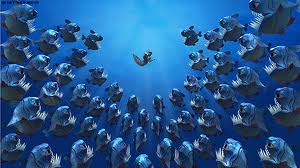There are certain words that we carry with us wherever we go. Sometimes tacked onto us by friends or strangers, sometimes dragged behind us by leashes of our own making, they follow us and seem to declare their existence at every moment.
Mine is weak.*
It’s like some indelible curse, scrawled on every mirror, sports field, tool, or disappointed face – a damning refrain of inescapable truth. I hate it. And yet I continue to grip the worn tether.
I think it’s because I have generally understood weak to be a safe word; one that demands nothing from me and gives me a reason to push away all that might complicate my life. If I’m so weak, I must protect myself. Tension and complexity and nuance become the enemy – threats to my fragile stability and brokers of an inevitable compromise. After all, I’m weak, I can’t handle it. A pious and poisonous half-truth that I’ve believed for most of my life.
But that’s changing.
The conviction that I need to speak up and step out, to move deep into the tension and dedicate myself to truly loving those around me, allowing their lives to press into mine, is overriding the base urge to shield myself from any and all pain. And as pin-prick circulation returns to my knuckles I am realizing that being weak isn’t the problem: being selfish and afraid is.
Because I am weak. And yet as I started to see a year ago, such weakness can be a beautiful opportunity to move forward in trust. That one word, weak, used to bring forth a comprehensive, anxious distrust that paralyzed me, but now it’s starting to have the opposite effect. Over the past year as I’ve blogged, emailed, met-for-coffee, and prayed, I’ve never ceased to be filled with wonder at the ways God has proven himself faithful to use my weakness to bring life…
…as a hushed confession of shame erupts into a boisterous oh-my-god-me–too! and a newfound freedom takes root amidst the shared laughter.
…as friends step up and become heroes.
…as an “issue” becomes a living, breathing, hurting human for someone and their world changes.
…as I find myself feeling more alive, more loved, more hopeful, and more passionate than ever before.
I could go on. I’ve had the chance to meet and become friends with so many incredible people as a result of that one decision to move beyond my frightened comfort zone. Friends who agree with me, disagree with me, think I’m crazy, force me to dig deep and reexamine what I thought to be true, inspire me, frustrate me, and point me to Christ. I would have never met any of them, never encountered the gospel of their lives, if I’d let my fear of pain decide it was more important to shelter myself from it all.
So you think I’d get it by now. But…
A few weeks ago, the damning refrain crept back into my mind.
You’re pathetic.
They’ll tear you apart.
You’re so disgustingly weak, you’ll never make it.
I was sprawled on the couch of a friend unsuccessfully trying to convince my exhausted brain that, really, it’s more fun to sleep than implode, watching tattered visions of all that could undo me flicker in an out of focus. It was my first week back in the States; DoMA and SCOTUS were still trending on Twitter and lighting up my Facebook feed. From the moment I deplaned I was confronted with the fact that I was, once again, caught in a controversy. An old anxiety started gathering around the fringes of my awareness and I couldn’t shake it off.
You’re going to give in.
I pulled the blanket over my head. I’d spent the afternoon hanging out with new friends – a warm and hilarious couple who let me tag along on a date – and I was wrestling with my tired mind about it.
You’re weak. Protect yourself.
Those old lies that would have me believe it was “dangerous” to hang out with a loving, affectionate gay couple – two passionate Christians, at that! – kept replaying because wouldn’t life be simpler if you isolated yourself from anything that would complicate your beliefs? Wouldn’t it be easier if you spent all your effort on drawing lines and defending yourself and pushing away those who disagree? You’re going to crumble if you keep this up.
I carried these bitter thoughts with me to church the next morning. It had been almost ten months since I’d attended a eucharistic service, though I wasn’t really thinking about that as I waited in line to receive the elements. I was starting to feel a little bit crazy. The decision to begin living and writing more openly about my sexuality and faith seemed increasingly foolish in light of the mounting tension and you won’t be strong enough to help anyone, much less —
“This is Christ’s body, broken for you.”
— yourself and the controversy will consume you and you’ll be —
“This is Christ’s blood, shed for you.”
— ridiculed and misunderstood and abandoned and —
The accusations ended abruptly as I watched the chunk of bread slowly turn crimson. My mouth started to water. Then my eyes. I gently placed the elements in my mouth, and breathed deeply.
“Epiphany” is the only word I can use to describe that moment: a sudden burst of clarity that overwhelmed me and my whispering fears. The confusion of the preceding moments dissolved and in its place there appeared a calm certainty: this is the shape my life must take.
The eucharist rendered my life intelligible again.
Please bear with me as I gush:
We follow a Christ who was, and is every day, torn to pieces. He was misunderstood and ridiculed, or sometimes understood perfectly well and hated for what he said and did. He was nailed to a low-hanging plank and slowly suffocated outside the city gate. And this is how we are told to remember him.
Because this is our story. This is who we are becoming. People who love so fiercely that we throw ourselves into the midst of things so that there may be peace, so that the unloved would know the touch of a friend, so that the hopeless would see with new eyes and the neglected would discover what it means to have a family. We proclaim Christ, and him crucified.
And people may tear us apart for it. The tension will pull at our seams and always feel as if it is a second away from undoing us. We will have to struggle against the impulse to move back to safety, relieve the tension, remain untroubled, and bury our weakness.
But eucharist is the utmost display of weakness. The cross is weakness.
And this is the beauty of it.
The celebration of bread and wine is a sacrificial, destructive act. But the miracle of it is that as the body of Christ, the bread, is torn to pieces the body of Christ, the Church, is made more whole. We are nourished and drawn together and given the strength to carry on. We are empowered to boldly live in weakness.
This is how the power of Christ is made perfect in weakness: that although we are vulnerable we press deep into the suffering of the world and make it our own, although we may receive blows from every direction we refuse to let our capacity to love and forgive be beaten out of us, and although we are silenced and misunderstood we never disdain the sacred act of listening to another and seeking to understand. It seems like I will never cease having to relearn this most basic of truths, and I imagine that is why celebrating the eucharist will never cease to astonish and amaze me.
The fears that plagued me on my friend’s couch are still with me. Honestly, despite there being many incredible men and women who have gone before me, the idea of making information about my life and sexuality publicly available is a bit terrifying. I mean, gosh, writing under my real name about being an evangelical Christian who happens to be gay is just begging random strangers to take nasty, painful swipes at me.

Pictured: a good time to be had by all.
And yet I’ve never felt so at peace about this process nor so confident that the Church will be there for me in and through it all. This is why I think now is such an important time for me to temporarily step away from blogging: to allow this abundant energy to drive me further into spiritual discipline and wise counsel so that, when I do finally “come out,” I will be more grounded in the living grace of my God with whom I’ll have sat in blessed silence and more in love with his Church that will sustain me and inspire me to act in truth and humility.
Thanks again for your kindness and patience with me over this past year; it’s been quite a journey. Thank you for all you’ve taught me and for all the ways you’ve challenged me to grow in my faith. I may never have the pleasure of getting to meet you, but I take great joy in knowing that our many voices sing together in awe of our Savior and our weary souls dance together toward the table of clarity and grace.
Peace, friends.
Jordan
______________________________________________________________________
* Like, if Harry Potter and all that were real (deep breaths deep breaths) my patronus would probably be an asthmatic woodland rodent of some kind.**
** Just kidding, I’ve actually thought about this a lot and it would totally be an otter, which is, according to trustworthy friend-sources, my “animal personality” (i.e. playful, creative, smelling of shellfish and brine, intelligent, et al.).***
*** It is also, I’ve been told, my gay bar body-type classification. Layers, you guys, layers.****
**** No, mom, I’ve never been to a gay bar. *****
***** I’d rather not end on that note, so here’s 2 Corinthians 12:9 – “But he said to me, ‘My grace is sufficient for you, for my power is made perfect in weakness.’ Therefore I will boast all the more gladly about my weaknesses, so that Christ’s power may rest on me.” (NIV). Blessings.


